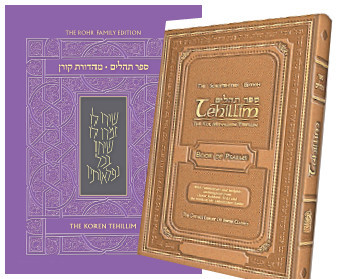Thanksgiving in daily prayer
With Thanksgiving Day to be observed next week I would like to bring to your attention the Jewish liturgical roots of that holiday’s theme and purpose. The theological basis for the act of giving G-d thanksgiving is to be found in the daily recitation of Psalm 100 in the morning service.
This psalm has been the focus of numerous English commentaries; two of them constitute the theme of this week’s review. First we will consider Rabbi Dr. Tzvi Hersh Weinreb’s commentary in the Koren Tehillim (Koren Publishers, 2015).
“There is something about gratitude,” explains Rabbi Weinreb. “It can’t be expressed in solitude. Sure, it is a very spiritual feeling. It makes you feel close to G-d. But it also makes you shout for joy. It makes you sing and dance. It makes you want to tell your story. It makes you want to throw a party.”
Rabbi Weinreb further brings to our attention the following:
“There is a circular relationship between gratitude and faith. The person of faith is more likely to experience gratitude; for he realizes that he is entitled to little, so that every one of his benefits is experienced as a divine blessing.
“Gratefulness also produces faith, because it is an emotion which demands expression. There is no more effective expression of that emotion than prayers of praise to G-d.
“Our Psalm also suggests that not only is thankfulness naturally shared with others, by all men on earth, but it resounds forever, throughout eternity: His faithfulness lasts through all generations.”
Rabbi Weinreb concludes by further universalizing the theme of thanksgiving:
“A perfect world certainly is a world in which gratitude prevails. Our task is to cultivate gratitude even in the imperfect world, which we occupy.
“Our Psalm inspires us, and enables us to perform this task effectively.”
Rabbi Chaim Miller, in his commentary, The Kol Menachem Tehillim-Psalms (Shottenstein Edition, 2013) teaches us the following from the text of Psalm 100:
“Even when the significance of sacrifices and prayers becomes curtailed in the future era, the practice of thanksgiving will remain significant.’’
Further, Rabbi Miller teaches from the Midrash Rabah: “In the future all sacrifices will be annulled, but the Thanksgiving-offering will not be annulled. All prayers will be annulled but thanksgiving will not be annulled.”
The very title of this psalm has within it the concept of saying thanks — “Mizmor L’Todah,” a Psalm of Thanksgiving.
For us, everyday is thanksgiving. The pilgrims of early New England, and the founding fathers of our republic, saw fit, despite the secular nature of our governance, to institute an annual thanksgiving commemorative. This surely speaks well of these early American leaders and still sets the tone for the sacred recognition by our country of the beneficence of the deity.
For us American Jews there is an ever further spiritual take. The recitation of liturgy from the Book of Psalms serves as the sacred basis of the Jewish worship service. It behooves us to further familiarize ourselves with the content of the deeper inner spiritual as well of the linguistic meaning of this biblically based liturgy.
Enjoy you holiday by giving this Psalm, 100, closer attention in your prayers.
Contact Alan Jay Gerber: Columnist@TheJewishStar.com

 80.0°,
Partly Cloudy
80.0°,
Partly Cloudy 




